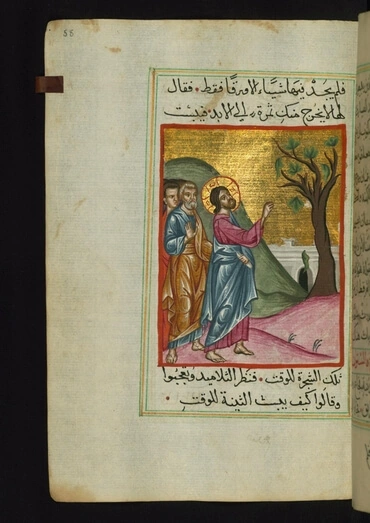17
І, покинувши їх, вийшов осторонь із города в Витанию, й пробував там.
17
І, покинувши їх, вийшов осторонь із города в Витанию, й пробував там.
Napsal(a) Brian David

There are a couple of different ways to read this verse, both of which may well be right. One is as a broad commentary on the states of the Jewish church at the time; the other is about the states withing Jesus at that time.
A "city" can represent a doctrinal system in general. In this case the city is Jerusalem, which at this point represents the state of the external church that exists in the Jewish nation. "City," however, can also represent the "doctrinal system" that exists in the mind of an individual person, governing his or her day to day activities. We don't know the meaning of Bethany for sure, but it appears to represent a more elevated spiritual state than the "city" of Jerusalem. Lodging or spending the night generally means a state of spiritual obscurity, without less of the love and wisdom represented by the heat and light of the sun. That state can also extend to the point of temptation and the preparation for judgment.
Looked at broadly, then, this verse shows Jesus, after a day assessing the state of the external church, returning to a more elevated state where he can relax and rest. Looked at more narrowly, it shows Jesus, after a day setting in order the externals of His own mind, looking to more internal states instead and exposing Himself to the temptations that would prepare Him for the crucifixion that would come five days later.
It follows, then, that in the Bible cities represent various doctrines – collections of inter-related ideas about spiritual reality. Such doctrines can be based on anything from the Lord's true teachings – the New Jerusalem seen by John in Revelation – to the falsity and heresy of Sodom and various cities obliterated by the people of Israel at God's commnd.
On the most personal level, a city can also represent the natural mind of one person – which makes sense since we each to some extent have our own doctrine, our own set of ideas and beliefs.
So it seems perhaps that Bethany represents a state of spiritual goodness – goodness centered on loving the neighbor – which is open to and accepting of the Lord, not so much from religion but from the heart. That, however, is just an opinion, a possibility.
In general, night time is a state of obscurity – a state in which we are removed from the love and understanding represented by the warmth and light of the sun. Spending the night, then, represents staying in such an obscure state.
Sometimes the phrase also implies judgment: Temptations can leave us feeling lost, separated from the Lord's caring and inspiration, but those are the states we need to enter for the Lord to remove evils from us. When the angels visited Lot in Sodom in Genesis 19 and agreed to spend the night, the spiritual meaning is one of judgment.